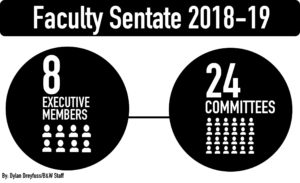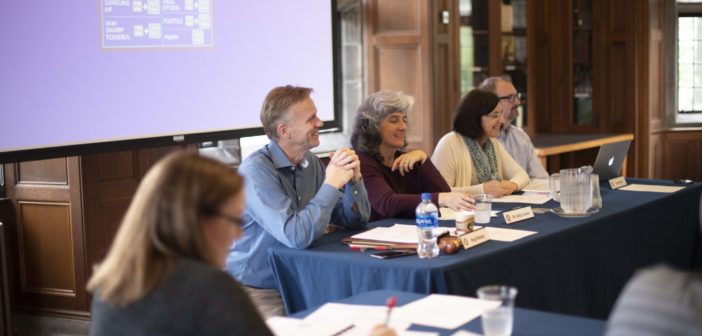Lehigh’s first Faculty Senate was approved in July and began meeting this fall.
An executive board of faculty members, including Senate Chair Douglas Mahony, began planning the Senate in September 2016. Mahony said there were two failed attempts to form a faculty senate in the past.
“Starting in the late ’90s, (faculty members) tried to implement a senate several times and it always failed,” Mahony said. “In part, I think this is because some faculty were very married to the idea of going to a meeting to influence policy.”
Mahony said faculty meetings became an ineffective form of governance because attendance was so low.
After the Senate proposal was finalized at the end of the 2017 academic year, Mahony moved it through to the Board of Trustees.
“Faculty didn’t feel that they were able to actively participate in governing roles and so (they) wanted to engage with (administration) at a higher level,” said Mary Kathryn Iovine, the vice chair of the Faculty Senate Executive Committee.
 Mahony said while the governing body will be an organizing voice, it will not replace other faculty involvement. The Faculty Senate Executive Committee consists of a chair, vice chair and secretary. There are also standing committees to help process specific faculty concerns.
Mahony said while the governing body will be an organizing voice, it will not replace other faculty involvement. The Faculty Senate Executive Committee consists of a chair, vice chair and secretary. There are also standing committees to help process specific faculty concerns.
Iovine said the 24 standing committees are divided by topical area, including compensation, facilities, planning and educational policy.
Monthly meetings are held throughout the academic year in the University Center or Linderman Library, but Mahony said the Senate is looking for a more permanent home that is conducive for the upcoming year.
Faculty Senate Secretary Jill Forrest supports faculty administratively by updating and posting all of the documents used in meetings.
She said the Faculty Senate website and Course Site page have helped keep faculty informed about issues discussed in meetings.
Mahony said faculty can find details about prior meetings, upcoming meetings, documents with motions and other interests on the Senate’s website. He said Faculty Senate plans to collaborate with both the undergraduate and graduate student senates.
While faculty, undergraduate and graduate students are included and may participate in Faculty Senate affairs, Mahony said these groups cannot vote, amend or make motions at the meetings. He said the Senate collects information and sends out surveys to gauge faculty opinion.
“The Senate aims to support inclusivity and fairness for everyone,” Mahony said. “It is designed to think more broadly about faculty interests and concerns.”






Comment policy
Comments posted to The Brown and White website are reviewed by a moderator before being approved. Incendiary speech or harassing language, including comments targeted at individuals, may be deemed unacceptable and not published. Spam and other soliciting will also be declined.
The Brown and White also reserves the right to not publish entirely anonymous comments.